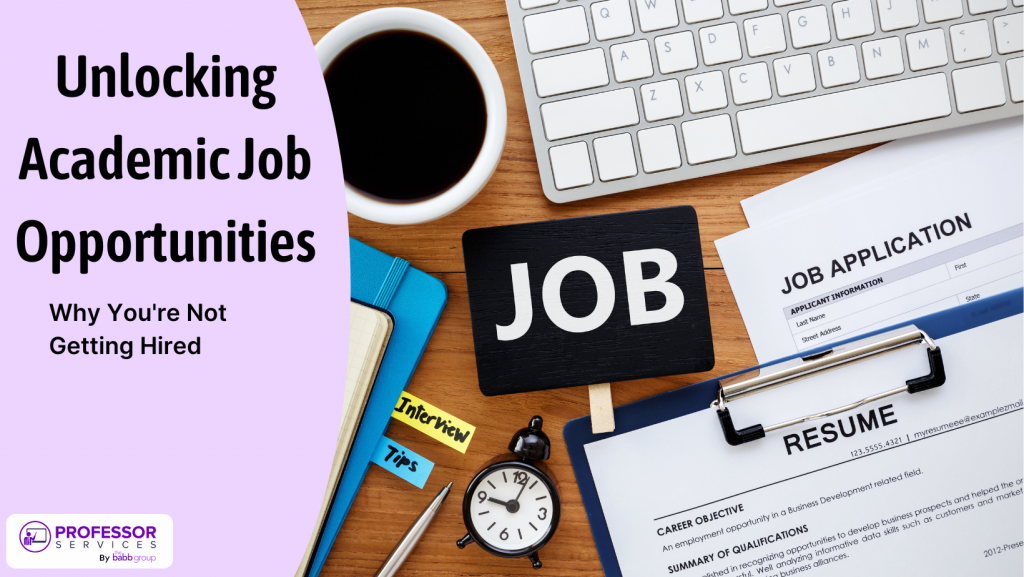
Why You Need a Curriculum Vitae (CV)
When it comes to academic jobs, a curriculum vitae is the gold standard.
Vice President of Academic and Professor Services Dorothy Miraglia, Ph.D., says she often sees applicants missing opportunities by sending a resume or a slightly beefed-up resume instead of a complete and professionally-written CV.
Miraglia explains further, “It’s much more than putting your work experience in chronological order. A CV showcases your subject matter expertise, LMS knowledge, personal attributes, research, teaching philosophy, and personality. It’s a space to share how you apply professional skills to a classroom.”
Unlike a resume, which is concise and tailored to highlight professional experiences and achievements, a CV provides a comprehensive overview of your academic background, research, publications, teaching experience, and other relevant accomplishments. It showcases your expertise and potential academic contributions, allowing potential employers to assess your suitability for their institution.
It’s a more robust document detailing your professional, educational, and academic life than a resume and is typically much longer.
You might also like 4 Ways a CV is Different from a Resume.
Why You Need LinkedIn
A strong presence on professional networking platforms like LinkedIn is crucial. After your CV, your completed LinkedIn profile is the most important thing you can have in your teaching portfolio. Deans go to LinkedIn first after they view their shortlist of applicants. If you don’t have a LinkedIn profile, you may lose out to a candidate with one.
Use LinkedIn to build your professional network, engage with colleagues, share your research, and highlight your accomplishments. By leveraging this platform, you can establish yourself as a knowledgeable and engaged professional in your field, increasing your chances of being noticed by potential employers.
Be sure to include a professional-looking photo. Look job ready.
Copy your CV to your LinkedIn profile. The real advantage of LinkedIn is that you can embed research articles, presentations, your CV, and more into your profile. So take advantage of this feature!
- eLearning Consultant
- Online Instruction
- Biology and Anatomy/Physiology
- Higher Education
- Sociology Researcher
- Course Designer
- Curriculum Developer
Be Persistent
Applying for academic jobs can be a numbers game. It’s not uncommon for candidates to submit multiple applications before receiving an interview offer. Remember that universities and colleges often have specific hiring cycles, and positions may only become available sporadically. So, keep going if you don’t hear back immediately. Continue refining your applications and pursuing opportunities that align with your career goals.
If you apply to jobs every week, your application and CV will land in some inboxes at just the right time.
Don’t have the time for all those applications or know where to find leads? Professor Services can help.
Upskill and Demonstrate Curriculum Design Expertise
Hiring managers are looking for more than industry experience, they want to know instructors understand how to design and deliver effective courses. Emphasize your experience developing syllabi, designing courses, or implementing innovative teaching methods. Highlight your curriculum development, assessment, and pedagogy skills, as these are often sought-after qualities in higher education institutions.
If you need more experience, Miraglia has suggestions to build your CV. She says, “When someone asks me about getting started with no experience, I recommend online tutoring or creating their own course that ties to their industry to show how they can bring their real-world experience into the classroom.” Volunteer to facilitate workshops and showcase your industry experience leading trainings.
Leverage Your Industry Experience
To complement full-time faculty, schools often hire adjuncts who are still working in their field. Highlight your professional accomplishments and demonstrate how your real-world expertise can enrich the classroom environment and give students insight into practical applications of the subject matter.
Securing a job in higher education can be challenging, but understanding the unique dynamics of the academic job market can significantly enhance your chances of success. Crafting a compelling curriculum vitae, developing a solid presence on LinkedIn, persistently applying to relevant positions, showcasing your curriculum design expertise, and leveraging your industry experience are key strategies to unlock academic opportunities. Remember, each application and interview is an opportunity to refine your approach and grow professionally. Stay determined, be proactive, and with perseverance, the right academic job may be just around the corner.
Angela
Latest posts by Angela (see all)
- The Art of Connection: Networking and Professionalism in Academia - July 25, 2024
- Got the Teaching Job? Now, You Need To Attend the Faculty Training - July 1, 2024
- Higher Education Trends: Insights from Our COO, Sheila Fry - June 20, 2024
